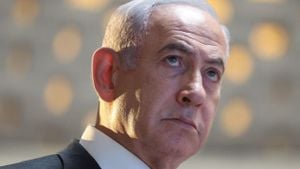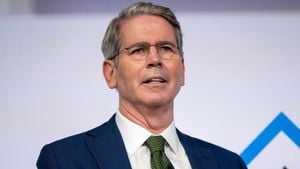At the recent COP29 U.N. Climate Summit held in Baku, Azerbaijan, Bangladesh's interim leader, Muhammad Yunus, voiced his concerns directly at the heart of climate negotiations. Yunus called for rich nations to take responsibility for their role in climate change rather than just negotiating about it. He stated, "Why should there be a negotiation? You are causing the problem, then you solve it," emphasizing the need for accountability from those who have contributed the most to global warming.
Yunus's comments came at a time when many countries, especially those with economies fueled by fossil fuels, continue to debate how to mitigate the effects of climate change. He argues this passive approach is inadequate, especially for countries like Bangladesh, which face dire consequences due to climate changes like rising sea levels and frequent cyclones. He likens the climate talks to bargaining at a fish market, contending they demean the seriousness of the issue. "That’s a very wrong perception of the whole thing," Yunus added.
Bangladesh, known as one of the most vulnerable countries to climate change, might lose up to 17% of its land to rising seas, and its people regularly endure intense cyclonic storms. Yunus highlighted the irony of rich nations negotiating terms when, as he put it, “everyone’s home is on fire.” He insisted these powerful countries must act not only out of compassion for less affluent nations but also for their own self-interest, as climate change affects the entire planet.
Taking the office of interim leader following the resignation of Sheikh Hasina, Yunus has vowed to focus on clean energy initiatives and to protect the population from climate-related disasters. He insists any government, whether interim or established, should prioritize addressing the crisis. “Whether it’s an interim government or no government or a democratic government,” Yunus stated, “whatever government is in power should be aware and has to work hard to stop the fire.”
His remarks reflect broader frustrations felt by many developing nations at these climate negotiations, where the stakes are incredibly high due to their geographical vulnerabilities. For Yunus, this isn't just about negotiating funds; it’s about confronting the countries historically responsible for the emissions leading to climate change. He called out the prevailing attitude of negotiating instead of taking immediate actions to fund climate mitigation directly.
Backed by his experience as the "banker to the poorest of the poor" and as a Nobel laureate, Yunus's critique holds substantial weight. His perspective sheds light not just on the pressing needs of his own country, but on the broader ethical responsibilities of wealthier nations. He stressed, "Rich nations, who developed their economies by burning planet-warming coal, oil, and gas, are not safe either. So they have to act in their self-interest as well as the interest of the whole planet.”
Yunus's position is echoed by many activists and leaders from climate-impacted nations. They urge the global community to act decisively, rather than engage in discussions perceived as prolonging the inevitable effects of climate change. The urgency for action outlined by Yunus is reflective of the sentiments shared by many who bear the brunt of climate change's devastating impacts without having contributed significantly to the problem.
While some nations at COP29 continue to deliberate pathways to sustainability and financial assistance, Yunus’s address serves as a powerful reminder of the realities faced daily by millions affected by climate-related disasters. Will the rich nations heed his call and put aside negotiations for more effective actions to finance intervention and adaptation strategies?



